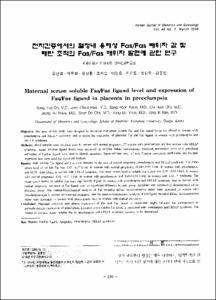KUMEL Repository
1. Journal Papers (연구논문)
1. School of Medicine (의과대학)
Dept. of Obstetrics & Gynecology (산부인과학)
전자간증에서의 혈청내 용해성 Fas/Fas 배위자 값 및 태반 조직의 Fas/Fas 배위자 발현에 관한 연구
- Keimyung Author(s)
- Park, Joon Cheol; Kwon, Sang Hoon; Cho, Chi Heum; Rhee, Jeong Ho; Cha, Soon Do; Yoon, Sung Do; Kim, Jong In
- Department
- Dept. of Obstetrics & Gynecology (산부인과학)
- Journal Title
- 대한산부인과학회지
- Issued Date
- 2006
- Volume
- 49
- Issue
- 3
- Abstract
- Objective: The aims of this study were designed to determine that serum soluble Fas and Fas ligand levels are altered in women with preeclampsia and HELLP syndrome, and to assess the expression of placental Fas and Fas ligand in women with preeclampsia and HELLP syndrome.
Methods: Blood samples were obtained from 31 women with normal pregnancy, 27 women with preeclampsia and five women with HELLP syndrome. Serum Fas/Fas ligand levels were measured by enzyme linked immunoassay. Immunohistochemical stain with polyclonal antibodies of Fas/Fas ligand were used to identify apoptosis. Mann-Whitney test, x2 test, Pearson correlation coefficients and multiple regression test were used for statistical analysis.
Results: Both soluble Fas ligand and Fas were detected in the sera of normal pregnancy, preeclampsia and HELLP syndrome. The mean serum level of soluble Fas was 5.83±0.37 U/mL in women with normal pregnancy, 10.84±0.93 U/mL in women with preeclampsia, and 10.79±0.69 U/mL in women with LELLP syndrome. The mean serum level of soluble Fas ligand was0.59±0.03 U/mL in women with normal pregnancy, 0.51±0.21 U/mL in women with preeclampsia, and 0.60±0.01 U/mL in women with LELLP syndrome. The mean serum levels of soluble Fas were significantly higher in women with preeclampsia and HELLP syndrome than in women with normal pregnancy, but those of Fas ligand were no significant difference in each group. Apoptosis was conclusively demonstrated within placental tissue. The immunohistochemical analysis of Fas revealed diffuse immunoreactive stains were increased in women with preeclampsia than in women with normal pregnancy. But the immunohistochemical analysis of Fas ligand revealed diffuse immunoreactive stains were decreased in women with preeclampsia than in women with normal pregnancy.
Conclusion: Placental apoptosis and altered expression of Fas and Fas ligand in trophoblast might influence the pathogenesis or pathophysiologic mechanism of preeclamsia. Elevated serum soluble Fas levels is associated with preeclampsia and HELLP syndrome. The source of elevated serum soluble Fas in preeclampsia and HELLP syndrome remains to be determined.
목적: 본 연구는 정상임신, 전자간증 및 HELLP 증후군 임산부의 태반에서 세포사멸 면역 조절인자인 Fas 및 Fas 배위자의 태반 내 발현을 비교하고, 전자간증 및 HELLP 증후군 임산부의 혈청 내 Fas 및 Fas 배위자의 변화를 관찰하기 위하여 본 연구를 시행하였다.
연구 방법: 정상 단태 임신부 31명, 전자간증 임신부 27명, HELLP로 변환된 전자간증 5명을 대상으로 혈청 샘플을 얻어 Enzyme linked immunoassay에 의한 방법으로 결과를 얻었으며, 태반에서 세포사멸을 관찰하기 위하여 광학 현미경 및Fas/Fas ligand에 대한 면역조직화학 염색을 시행하였다. Mann-Whitney test, x2 test, Pearson correlation coefficients와 multiple regression test를 통계에 이용하였다.
결과: 광학현미경적 관찰에서 태반 내 세포사멸을 정상임신, 전자간증 모두에서 관찰할 수 있었다. 또한 면역조직화학염색 을 이용하여 세포사멸 관련 단백질 발현을 영양막 세포에서 조사한 결과 Fas 단백의 발현은 전자간증 군에서 정상임신 에 비해 증가하는 양상을 보였고 Fas 배위자 단백의 발현은 전자간증 군에서 정상임신에 비해 발현이 감소하는 양상을 보였다. 그리고 Fas 배위자 단백의 발현은 Fas 단백에 비해 발현의 강도가 미약하였다. Fas의 평균값은 정상 임산부의 경우 5.83±0.37 U/mL, 전자간증 임산부의 경우 10.84±0.93 U/mL, HELLP 증후군 임산부의 경우는 10.79±0.69 U/mL이 있으며, Fas ligand의 평균값은 정상 임산부의 경우0.59±0.03 U/mL, 전자간증 임산부의 경우 0.51±021 U/mL, HELLP 증후군 임산부의 경우는 0.60±0.01 U/mL이었다. 따라서 전자간증임신과 HELLP로 변환된 전자간증에서 soluble Fas값이 정상 단태 임신보다 통계학적으로 유의하게 높았으나 (P<0.01), Fas ligand의 경우 각 군간의 차이는 없었다.
결론: 전자간증 태반에서의 세포사멸 조절인자 인자인 Fas 배위자 발현의 감소와 Fas 발현의 증가의 소견을 보여 세포사멸이 더 많이 발생되는 것으로 생각되며, 이는 전자간증의 발병을 유발하는 병적인 과정이거나 원인의 한 요소로 사료된다. 증가된 혈청 내 용해성 Fas는 전자간증과 관련이 있는 것으로 사료되며, 이와 같은 증가는 모체의 T 임파구 apoptosis 의 보호를 의미하며, 결과적으로 전자간증에서의 모체의 immune intolerance로 이어지는 것으로 생각된다.
- Alternative Title
- Maternal serum soluble Fas/Fas Ligand Level and expression of Fas/Fas Ligand in placenta in preeclampsia
- Publisher
- School of Medicine
- Citation
- 오상엽 et al. (2006). 전자간증에서의 혈청내 용해성 Fas/Fas 배위자 값 및 태반 조직의 Fas/Fas 배위자 발현에 관한 연구. 대한산부인과학회지, 49(3), 520–526.
- Type
- Article
- ISSN
- 1738-5628
- Appears in Collections:
- 1. School of Medicine (의과대학) > Dept. of Obstetrics & Gynecology (산부인과학)
- 파일 목록
-
-
Download
 oak-bbb-1495.pdf
기타 데이터 / 1.08 MB / Adobe PDF
oak-bbb-1495.pdf
기타 데이터 / 1.08 MB / Adobe PDF
-
Items in Repository are protected by copyright, with all rights reserved, unless otherwise indicated.